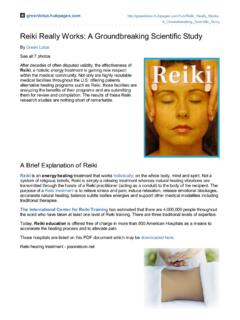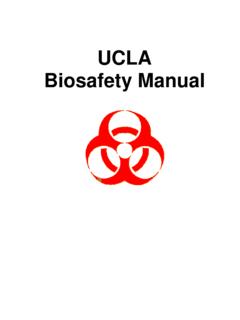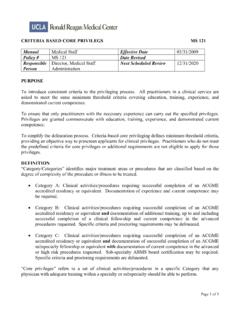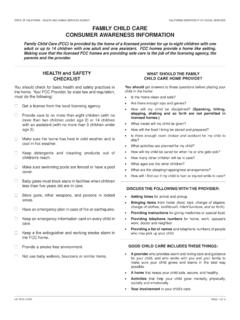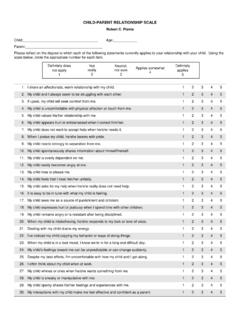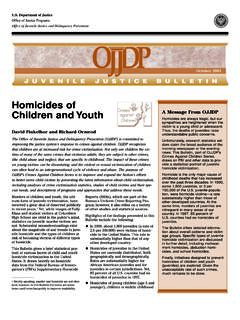Transcription of Coping With Grief When Your Child Dies - UCLA Health
1 Coping With Grief When Your Child DiesGrief reactions: yearningThe early grieving period often is accompanied by a sense of yearning for the Child who died. You may feel an overwhelming desire to hold your Child in your arms again, to be reunited with him or her. Your inability to fulfill this desire may make you irritable, restless, frustrated and depressed. You may struggle to keep a clear picture in your mind of your Child s appearance, smell, voice and mannerisms. You may find it comforting to keep special remembrances of your Child , such as a picture, a name bracelet, a blanket, a lock of hair, a special toy or cards from family and friends. Some parents attempt to fill the emptiness they feel by having another Child . This decision is best postponed during the immediate period after a Child s death to allow parents to mourn their loss. After some time, you can welcome a new baby for himself or herself rather than as a replacement for the Child who has reactions: lonelinessYou may feel an overwhelming sense of loneliness.
2 Even when you are surrounded by loving and caring family and friends, you may still feel isolated in your Grief . Your loneliness may be accompanied by a physical aching sensation. Your heart may literally hurt and feel as if it is breaking. Your arms and legs may feel heavy, and you may lack the strength to stand. You may feel as though you are functioning on a different emotional level than others around you. You may find it difficult to express your Grief with words. Many parents describe feeling as if they have lost control of themselves and their emotions. Sometimes they fear they are losing their minds or sinking into a deep hole. Grief reactions: angerYou may also feel strong feelings of anger. You may feel angry toward your spouse, other family members or your Child s physicians and nurses. You may even be angry with your Child for leaving you. Seeing other families with children may be painful.
3 You may feel envious of their happiness and togetherness and upset by what feels like their insensitivity to your situation. You may become angry when other parents appear to lack appreciation for treasured moments with their children. Hearing about abandoned or abused children may be especially difficult. All of these feelings are normal. You may also direct anger toward yourself in the form of self-blame or feelings of failure. You may wonder if somehow you caused your Child s death. These feelings may challenge your perception of yourself as a loving, competent and protective parent. You may question your ability to care for surviving or subsequent children. You may feel like less than a whole person. While these are natural feelings following a Child s death, it is important to remember your strengths as a parent and everything you did to help your Child . Positive memories of your relationship with your Child can bring comfort and renewed reactions: sleepYou may find that you are unable to sleep or that you sleep all the time.
4 When you do sleep, you may dream of your Child . Initially, your dreams may be unsettling. Over time, however, you may find that your dreams reflect more positive experiences and become more of a source of healing. Grief reactions: physical ailmentsPhysical ailments may be aggravated by the inner tension you are feeling. Physical reactions may include difficulty eating or overeating, gastrointestinal disturbances, exhaustion, heart palpitations, nervousness or shortness of breath. Also, bereaved parents commonly experience an inability to focus. If these reactions interfere with your daily responsibilities or are persistent, it is important to seek help from your doctor or new normal One of the challenges of being a grieving parent is developing a new normal. Your life will never be the same and you may find yourself categorizing memories into before and after, marking time from the loss.
5 Your Child will always be a part of your life, but these changes are part of your new existence. You may find it helpful to talk to other bereaved parents who have found new ways to integrate the memories of their children into their lives. You may experience moments when a passing memory or a special date will trigger intense feelings of Grief , but over time, you will be able to cope better with these experiences. Relationships with family and friendsThe death of a Child affects immediate and extended family members, as well as parents. The ways people express their Grief may vary greatly. Spouses may experience the loss differently and work through their Grief in different ways. Other children may not fully understand the way a family changes after a death. It may be difficult for you to respond to the Grief of others when you are struggling with your own. Family members sometimes find it hard to support and comfort each after the death of your Child , family and friends typically gather to offer comfort and support.
6 You may find that there are special people you wish to have near you and with whom you can share some of your feelings. You may want some time alone. It is important to let people know what your specific needs may time goes on, you may find that family and friends are less available. Relatives and friends may be returning to their daily routines when you still need people who will listen and care. The support you felt at the time of your Child s death may seem to disappear. You may sense that people are uncomfortable hearing about your Grief and loss. Some people may suggest that you put your Grief aside and return to routine activities. You may feel as though you must hide your Grief , but you need someone who will listen when you want to talk. You may feel most comfortable talking to a family member or a close friend, or perhaps to a counselor or a therapist. Many parents find it helpful to talk with other parents who have lost a Child .
7 Coping With Grief When Your Child DiesChildren s understanding of deathParents are often concerned about how to explain their Child s death to other children, such as the Child s siblings, cousins, schoolmates or neighbors. Children typically do not understand death the same way that adults do. Their understanding depends on their age and level of cognitive less than 6 months of age are developing trusting relationships with the one or two people who care for them most often, usually their mother, father or grandparents. By the time infants are 1 year old, they have formed strong attachments to their parents and a small number of people who spend the most time with them. Although very young children do not understand death, they do sense when other family members are upset and that something has changed. They may react with crankiness or changes in sleep or eating patterns.
8 Young children need the reassurance of ongoing contact with their parents to feel safe and comforted. During the next several years, young children learn to cope with separation. At first, the loss of a significant person, even for a short time, may cause a young Child to cry, protest and search for that person. As they develop a better understanding of time and have more experiences of people leaving and coming back, children learn to cope with separation which is one of the basic cognitive tasks required to understand task is learning that out of sight does not mean absent, that something can be present without being visible. The infant game of peekaboo helps babies learn about presence and absence. Toddlers between 1 and 2 years can find hidden objects even when the hiding place is not readily apparent; yet, they often confuse reality with fantasy. They may say that their sibling is dead but then talk as if he or she was alive.
9 Toddlers think about people from their own perspectives of routines are important to toddlers, changes in the home after a death may be very upsetting to them. Toddlers often do not want the dead person s belongings disturbed. For example, they may want a place set at the table for their sibling who died. It may be important for you to allow this request so the toddler knows that you, too, continue to remember the Child who , toddlers adjust to the idea that their siblings are not coming back. You may have to explain this to the toddler and young Child repeatedly until they see and integrate the new reality. As toddlers grow older, they will be able to relinquish some of their between the ages of 3 and 5 years old have difficulty understanding that death is forever and will happen to everyone at some point in time. They usually have heard the word dead and typically understand death as a separation.
10 But they often think dead people still breathe and eat and will come back to life, just as they do in movies and cartoons. They might ask, Hasn t he been dead long enough? or Why can t we get a new sister? They need to learn that death is not like sleep, that when people go to sleep, they wake up again, but when people die, they are not alive anymore. Use clear language with preschoolers: His body stopped working. He will not eat, talk or walk anymore. He will not wake up again. The difference between reality and fantasy is not clear to preschoolers. They have magical thinking and believe that words and wishes can make good and bad things happen. They need constant reminding that words and thoughts do not have this power. Most preschoolers, at some point in their young lives, wish that their moms, dads or siblings would go away. If a family member actually dies, young children may be overwhelmed with guilt.






